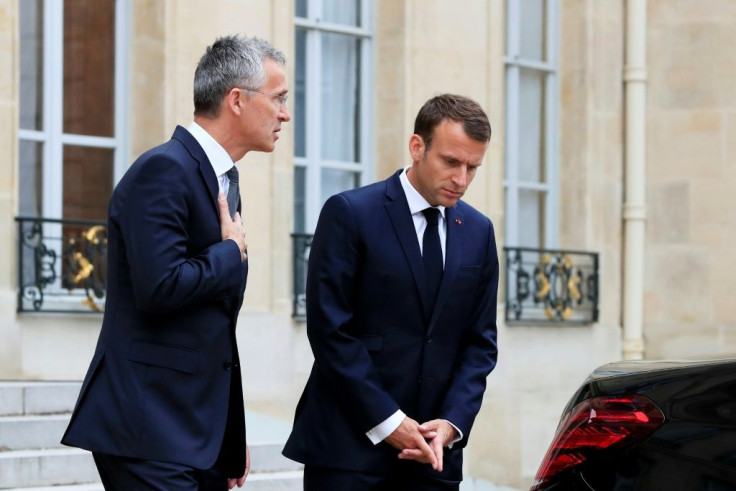Macron Defends 'Wake-up Call' For NATO After Talks With Chief

French President Emmanuel Macron on Thursday stood by his claim that NATO is suffering "brain death" with no strategic cooperation among members, after talks with alliance chief Jens Stoltenberg ahead of a high-stakes meeting outside London next week.
"I totally stand by raising these ambiguities because I believe it was irresponsible of us to keep talking about financial and technical matters given the stakes we currently face," Macron said at a joint news conference after the talks.
"A wake-up call was necessary," he said, regarding NATO's failure to address pressing challenges such as relations with Russia, the subject of Turkey, or even "who is the enemy?"
It is no longer Russia or China, Macron said: "Our common enemy... is the terrorism which has struck us all."
Macron also again took aim at Turkey, saying its unilateral offensive against a Western-backed Kurdish militia in Syria "endangers the actions of the anti-IS coalition of which NATO is a member".
Turkey reacted fiercely to the comment, accusing the French president of being a "sponsor of terrorism" in a bitter exchange that illustrated the gulf between the fellow NATO members.
Macron's "brain death" comment, published in an interview with the Economist magazine this month, drew sharp criticism from allies, not least Stoltenberg, who warned against undermining the transatlantic alliance.
Stoltenberg said Thursday that "in uncertain times, we need strong multilateral institutions like NATO," and that he had "good and open discussions" with Macron.
He praised in particular France's role in fighting the spread of Islamic terrorism in the Sahel region of Western Africa, where 13 French soldiers were killed this week when two of their helicopters collided in Mali.
Macron said that at next week's NATO meeting in Watford, northwest of London, he would urge allies to get more involved in the Sahel fight.
While Britain has provided helicopters and security personnel to help France's 4,500-member Barkhane force in West Africa, and the US provides intelligence support, Paris has so far failed to persuade other allies to make a significant contribution.
Stoltenberg said Thursday that if Macron requested NATO's help the alliance would consider the appeal "very seriously".
Macron also defended his push for a rapprochement with Russian President Vladimir Putin, rebuffing charges of naivety.
"Has the absence of dialogue with Russia made the European continent safer?... I don't think so," he argued.
In a controversial move, he suggested talks with Moscow over its call for a moratorium on deploying mid-range nuclear missiles in Europe.
The French president, who wants to wean Europe off its military dependence on the US, also insisted that European countries be involved in any efforts to forge a new missiles pact.
The combative French president also criticised Turkey's offensive against a Kurdish militia that had been leading the fight against the Islamic State in Syria.
"I respect the security interests of our Turkish ally, which has suffered numerous attacks on its soil," he said.
"But you cannot on the one hand say we are allies and demand solidarity in that regard and on the other hand present your allies with the fait accompli of a military operation that endangers the actions of the anti-IS coalition of which NATO is a member," he added.
In reponse, Turkish Foreign Minister Mevlut Cavusoglu said it was Macron who "is sponsoring the terrorist organisation, he receives them regularly at the Elysee" presidential palace.
Macron has sparked Turkish anger by hosting representatives of the Syrian Democratic Forces (SDF) at the Elysee palace. The SDF is dominated by Kurds from the People's Protection Units (YPG), which Ankara views as terrorists.
The comments set the stage for a possibly fractious NATO summit in London on December 3-4, which will be attended by US and Turkish presidents Donald Trump and Recep Tayyip Erdogan.
Macron will hold a one-on-one meeting with Trump -- as well as joint talks with Erdogan, British Prime Minister Boris Johnson and German Chancellor Angela Merkel -- on Tuesday ahead of the NATO summit, the French presidency said.
Fresh tensions have appeared within the alliance since last year's stormy meeting, after Trump's surprise decision to withdraw US troops from northeast Syria, a move that cleared the way for Turkey to attack the Kurdish forces.
Trump in turn has repeatedly accused European NATO members of freeloading on the US by falling short of their commitment to spend at least two percent of GDP on defence.
Stoltenberg confirmed that Washington would cut its funding to the alliance's operating budget to 16 percent of the total from 22 percent, with Germany and other nations taking up the slack.
Macron was dismissive of the budget debate.
"If some people want to see an example of what they term 'cost-sharing', they can come Monday to the ceremony France is organising" for the 13 soldiers killed in Mali, he said.
"There they will see the cost."
© Copyright AFP 2024. All rights reserved.




















